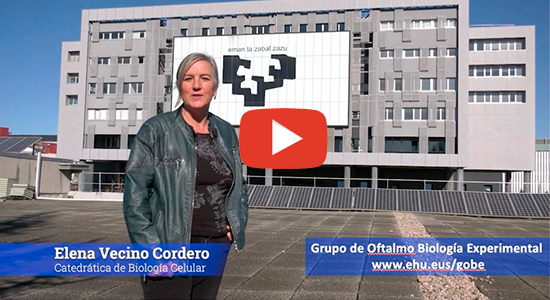Experimental Ophthalmo-Biology Group

We are a multidisciplinary group of biologists, biochemists, ophthalmologists and veterinarians, who share a common goal: to resolve the problems that arise in the visual system and to find solutions to these using different approaches.
The group leader is Dr Elena Vecino, Professor of Cell Biology at the Faculty of Science and Technology (UPV/EHU). Among the other members of the group are Dr Juan Durán de la Colina, Professor of Ophthalmology, and Dr Javier Araiz, Tenured Lecturer of Ophthalmology.
The team now forms a consolidated group, recognised as such by the Basque Government. At present, we participate in collaborative projects with research groups at other Spanish Universities (e.g., The School of Veterinary Medicine of the University of Murcia and the Department of Biochemistry of the University of Salamanca) and with research groups at other research centres in the Basque Country, for example at the Achucarro Basque Center for Neuroscience, and the Biodonostia, Biocruces and Bioaraba Health Research Institute. In addition, the group maintains alliances with international universities such as Harvard (USA), Cambridge (UK), Munich (D), California Davis (USA), Bordeaux (F), Coimbra (P) and the New York Medical College (USA).
We also have contracts with several biotechnology companies and R&D centres in the Basque Country: IMG Pharma, POLYMAT Institute for Polymer Materials, CIC-bioGUNE, CIDETEC and TECNALIA.
What are our main research objectives?
Using animal models of glaucoma, organotypic retinal cultures and cell cultures, our main objectives are:
-
To study the molecular mechanisms that trigger retinal neuron death in glaucoma. We aim to characterize factors or molecules that provide neuroprotection to the retina and to propose strategies that will protect retinal ganglion cells. We also focus our efforts on studying the Glia-neuron interactions in the retina (Prof. Elena Vecino, and Drs Noelia Ruzafa and Xandra Pereiro)
-
To study the factors that trigger Glaucoma, paying particular attention to the aqueous humor, trabecular meshwork and Schelmm's canal (Dr Aritz Urcola and Dr Elena Vecino)
-
To investigate the mechanisms causing retinal inflammatory pathologies and in particular, those causing epiretinal membranes and uveitis (Drs Javier Araiz and Alex Fonollosa)
-
To characterise ocular surface biomarkers that identify diseases, to design artificial tears and biomaterials for the delivery of ocular surface repair factors (Dr Arantxa Acera, Profs. Elena Vecino and Durán de la Colina).
